Akwesasne Shonataté:ron Host Residential School Survivors Dinner
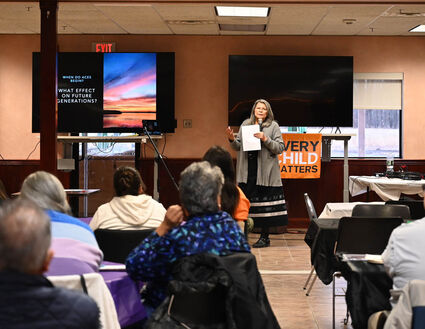
Chief Beverly Cook talking to survivors, children of survivors and supporters during the Akwesasne Shonataté:ron Host Residential School Survivors Dinner. She touched upon how experiences, of our family members, and of ourselves, going as far back in the womb – affect how we behave today.
On Sunday, December 4th, the Turtle's Nest Diner, Akwesasne was filled with people sharing the same common thread that binds all of us... you're a residential school survivor, you're a child of a residential school survivor, your aunt or uncle are residential school survivors. Or you're a young mom who finds the concept of your child/children being taken from you as bizarre as it is frightening. It would be difficult to find an Akwesasronon who hasn't been touched by the U.S. and Canada's attempt to remove our identities, culture, and language by removing our children from their homes.
The Akwesasne Shonataté:ron Host Residential School Survivors Dinner hosted an evening of speakers, presentations, and performances. The evening began with the Akwesasne Freedom School students reciting the Ohenton Kariwentekwen. Doug George – Kanentiio, president of Akwesasne Shonataté:ron program introduced himself and its missions and goals.
"We are the Mohawk Residential School Survivors, (the Akwesasronon Shonatatn:ron) those who endured kidnapping, isolation, displacement, hunger, physical punishment, linguistic suppression and cultural alienation while confined to institutions designed by Canada and administered by the Catholic and Anglican churches to kill our spirits and cripple our bodies.
They failed."
Akwesasne Shonataté:ron are actively searching for the missing residential school children. Searching archives to find the records of those who were stolen from their homes so that we may answer these fundamental questions: who was taken, how many were taken, where they were taken to, what happened to them at these places of confinement, where are the missing, what is the manner of death for those who perished at those institutions.
Akwesasne Shonataté:ron's director is Brian David Cole. Cole is currently creating and organizing Akwesasne Shonataté:ron's board members and staff of researchers. They plan to work with other organizations, working on the common goal of using contemporary technologies to locate the burial sites of the children and interviewing the survivors so their stories may be preserved.
"We are rising above being labeled as "victims" to take direct control of all aspects of the truth and reconciliation process. We reject any and all actions which do not directly involve our participation. Nothing will be done for us without us. No one may speak on our behalf without our express approval," Doug George – Kanentiio.
Presentations were given by Dr. Bev Jacobs, Verna McGregor, Chief Beverly Cook and Dr. Christopher Wolff.
Laura Arndt, Survivors Secretariat – Secretariat Lead, Six Nations said, "We will take our own approach. Each organization will take their own approach. Some may want to bring the children home; others may want to honor in place. The Mohawk Institute had children from 57 communities and covers two geographic regions – Hudson Bay to James Bay. It's the oldest residential school. We want to find out everything we can of their daily life at the Mohawk Institute from the context of the children. We have forty years of stories. We won't let this happen again. We will be vigilant, cautious and safe."
Dr. Bev Jacobs, Human Rights Monitor, "In the early nineties, during the Royal Commission on Aboriginal people's testimonies started coming out. We had so many social issues and at the time, no understanding of trauma and generational trauma. For me I used to wonder why we had so many social issues. Rea Bravehorse Yelllowheart, Columbia University studied the response of Jewish Holocaust survivors to Native Americans. Ninety percent of Native Americans have a form of post-traumatic stress syndrome. I think education and awareness are the key to healing. We must address this and do the hard work of healing. Learning makes you more resilient... we once lived in a world of abundance, now we live in a world of lack."
Dean George and friends sang several social songs with plenty of participants joining in. The smiles and laughter were a testament to our resilience and determination.
The talented Kanerahtiio White and the Lone Wolf band played several songs, lighting the mood of the evening with everyone enjoying the music.
The evening was rounded out with a traditional meal served of wild game – elk, moose meat, venison, wild rice, and squash.
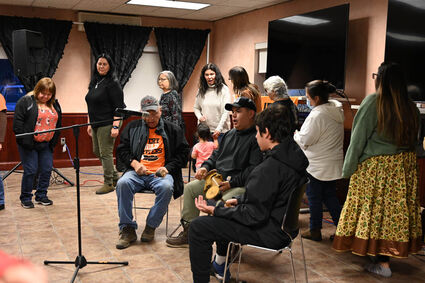
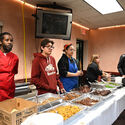
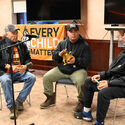
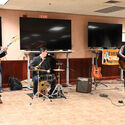
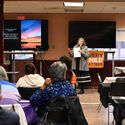
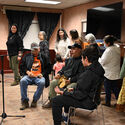








Reader Comments(0)